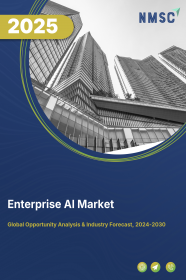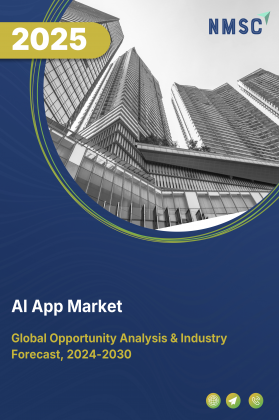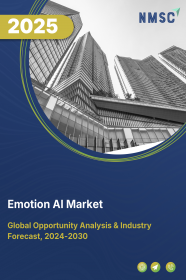
Enterprise AI Market by Component (Solution and Services), by Technology (Machine Learning, Deep Learning, Natural Language Processing, Image Processing, and Speech Recognition), by Organization Size (Small and Medium-sized Businesses, and Large Enterprises), by Deployment (Cloud, and On-premises), by Application (Security & Risk Management, Marketing Management, and Others), and by Industry Vertical (Manufacturing, and Others) - Global Opportunity Analysis and Industry Forecast 2022-2030
Market Definition
The Enterprise Artificial Intelligence (AI) Market size was valued at USD 15.8 billion in 2021 and is predicted to reach USD 104 billion by 2030 with a CAGR of 23.0% from 2022-2030.
Enterprise AI is a software technology adopted by organizations by incorporating artificial intelligence that integrates human abilities, such as learning, understanding, and interacting to a level of advancement that eventually surpasses human capabilities in the enterprise infrastructure. This technological advancement helps in the everyday activities occurring in a venture such as the automation of a few interactions combined with improvement in functional productivity with steady development in the organization’s structure. Enterprise AI deployment automates client interactions, enabling organizations to provide better customer support and personalized experiences. In addition, enterprise AI is equipped with a help desk that associates with the organization's cloud drive, files, and vital applications through application programming interface (API) integrations.
Market Dynamics and Trends
Growing demand for enterprise AI in various industry verticals including manufacturing, healthcare, and automotive owing to its automatic features such as industrial robots, automated vehicles, and virtual reality drives the market growth. Also, the increase in cloud-based services and the increase on the internet of things (IoT) technology coupled with the rapid adoption of AI in multiple industry verticals boost the market growth. For instance, in September 2021, C3 AI, anenterprise AI company announced to make its entire portfolio available on Google Cloud. It can further assist businesses to address real-world challenges and opportunities across multiple industries implementing AI tools.
The company will also work to help customers build and deploy machine learning models more quickly by ensuring its applications capitalize on Google Cloud capabilities such as Google Kubernetes Engine, Google BigQuery, and Vertex AI.Moreover,a rise in internet penetration paired with a huge amount of data processing and data generationsuch as structured, semi-structured, and unstructured in various enterprises globallyis expected to propel the growth of the market during the forecast period.
However, technical complexities due to the lack of expertise and unskilled workers are the factors that restrain the growth of the market. On the contrary, due to the low maintenance cost along with advanced pattern recognition and machine learning algorithmsto improve efficiency expected to create ample growth opportunities for the market in the coming years.
Market Segmentations and Scope of the Study
The Enterprise AI market is segmented based on component, technology, organization size, deployment, application, industry vertical,and geography. On the basis ofcomponents, the market is divided into solutions and services. On the basis of technology, the market is classified into machine learning, deep learning, natural language processing, image processing, and speech recognition. On the basis of organization size, the market is segmented into small and medium-sized businessesand large enterprises. On the basis of deployment, the market is bifurcated into cloud and on-premises. On the basis of application, the market is categorized into security &risk management, marketing management, customer support &experience, human resource &recruitment management, analytics application, and process automation. On the basis of industry vertical, the market is divided into manufacturing, media & advertising, BFSI, IT& telecom, retail, healthcare, automotive & transportation, and others. The geography breakdown and analysis of each of the aforesaid segments include regions such as North America, Europe, Asia-Pacific, and RoW.
Geographical Analysis
North America region is expected to hold the lion’sshare of enterprise AI market sizeand is expected to continue dominating the market during the forecast period. This is attributed tothe high adoption rate of artificial intelligence by SMBs and large enterprisesin terms of integration and innovation. For instance, in April 2022, the U.S. armyawarded 19 million USD to small businessesto develop AI/ML technologies under the ‘Small Business Innovation Research Program.This will enhance technological advancement in the field of electronic warfare, sensors, information systems, battlespace environments, and human systems. Also, due to the constant investment and coordination in automation technologies by both tech companies and start-ups in this region.
For instance, in July 2022, Google and Vodafone launched the AI Booster platformto handle thousands of Machine Learning (ML) models across countries. The platform is built upon Google’s Vertex AI and integrates with Vodafone’s Neuron platform. The main feature of this platform is automated ML lifecycle compliance activities such as driftdetection, the ability to explain, and auditability through reusable pipelines and managed services.Moreover, this region is home to over 70% of the enterprise AI mostly, especially in the U.S coupled with the presence of all the key players that provides AI services such as Google, Microsoft Inc, AWS and Intel Corporation are key factors that drive the market growth in this region.
On the other hand, Asia-Pacific is expected to show a steady rise in the enterprise AI market due to the rapid technological upgradation in the industries such as automotive, healthcare, manufacturing, and IT. For instance, in May 2022, according to the researchers of the International Institute of Information Technology (IIIT), Hyderabad launched the Intelligent Solutions for Road Safety through Technology and Engineering (iRASTE) project in Nagpur.This solution will alert drivers about the risks with the use of the Advanced Driver Assistance System (ADAS) to identify ‘grey spots’ on the road network. It will also help in monitoring roads in real time and create technical solutions to address current road blackspots for better road maintenance and infrastructure.
Also, increasing cognitive computing is simply the replication of human capacities that includes decision-making, thinking, learning and sensor perception are expected to drive market growth in this region. For instance, in November 2021, China is working on a new generation AI-brain project to achieve advances by modeling human cognition to help neuroscientists understand how the human brain works for cognitive neuroscience.
Competitive Landscape
The enterprise AI market comprising of various market players such as OpenAI, Anthropic PBC, Microsoft, Google (Alphabet Inc.), NVIDIA, IBM, Amazon Web Services, Inc., Salesforce, Inc, Oracle, SAP SE, C3.ai, Inc., Palantir Technologies Inc., ServiceNow, Snowflake Inc., Hewlett Packard Enterprise Development LP, Persado, Intel Corporation, DeepL, Jasper AI, INC., and DominData Lab, Inc.. These market players are adopting various strategies such as innovation and collaboration across various regions to maintain their dominance in the market.
For instance, in May 2025, OpenAI reached 3 million enterprise customers, with major deployments including the California State University system and expansion into Abu Dhabi.
Furthermore, in May 2025, Anthropic PBC achieved $3 billion in annualized revenue, up from $2 billion in March, as enterprise adoption accelerated.
Key Benefits
-
The enterprise AI market report provides aquantitative analysis of the current market and estimations from 2022 to 2030. This analysis assists in identifying the prevailing market opportunities to capitalize on.
-
The study comprisesan extensive analysis of the enterprise AI market trends including the current and future trends for depicting the prevalent investment pockets in the market.
-
The information related to key drivers, restraints, and opportunities, and their impact on the enterprise AI market is provided in the report.
-
The competitive analysis of the market players along with their market share in the enterprise AI market is mentioned.
-
The SWOT analysis and Porter’s Five Forces model are elaborated on in the study.
-
The value chain analysis in the market study provides a clear picture of the stakeholders’ roles.
Key Market Segments
By Component
-
Solution
-
Services
-
Professional Service
-
Managed Service
-
By Technology
-
Machine Learning
-
Deep Learning
-
Natural Language Processing
-
Image Processing
-
Speech Recognition
By Organization Size
-
Small and Medium-sized Businesses
-
Large Enterprises
By Deployment
-
Cloud
-
On-premises
By Application
-
Security & Risk Management
-
Marketing Management
-
Customer Support & Experience
-
Human Resource & Recruitment Management
-
Analytics Application
-
Process Automation
By Industry Vertical
-
Manufacturing
-
Media & Advertising
-
BFSI
-
IT & Telecom
-
Retail
-
Healthcare
-
Automotive & Transportation
-
Others
By Geography
-
North America
-
The U.S.
-
Canada
-
Mexico
-
-
Europe
-
The U.K.
-
Germany
-
France
-
Italy
-
Spain
-
Denmark
-
Netherlands
-
Finland
-
Sweden
-
Norway
-
Russia
-
Rest of Europe
-
-
Asia-Pacific
-
China
-
Japan
-
India
-
South Korea
-
Australia
-
Indonesia
-
Singapore
-
Taiwan
-
Thailand
-
Rest of Asia-Pacific
-
-
RoW
-
Latin America
-
Middle East
-
Africa
-
Key Players
-
OpenAI
-
Anthropic PBC
-
Microsoft
-
Google (Alphabet Inc.)
-
NVIDIA
-
IBM
-
Amazon Web Services, Inc.
-
Salesforce, Inc
-
Oracle
-
SAP SE
-
C3.ai, Inc.
-
Palantir Technologies Inc.
-
ServiceNow
-
Snowflake Inc.
-
Hewlett Packard Enterprise Development LP
-
Persado
-
Intel Corporation
-
DeepL
-
Jasper AI, INC.
-
DominData Lab, Inc.
REPORT SCOPE AND SEGMENTATION:
|
Parameters |
Details |
|
Analysis Period |
2021–2030 |
|
Base Year Considered |
2021 |
|
Forecast Period |
2022–2030 |
|
Market Size Estimation |
Billion (USD) |
|
Market Segmentation |
By Component (Solution, Services), By Technology (Machine Learning, Deep Learning, Natural Language Processing, Image Processing, Speech Recognition), By Organization Size (Small and Medium-sized Businesses, Large Enterprises), By Deployment (Cloud, On-premises), By Application (Security & Risk Management, Marketing Management, Customer Support & Experience, Human Resource & Recruitment Management, Analytics Application, Process Automation), By Industry Vertical (Manufacturing, Media & Advertising, BFSI, IT & Telecom, Retail, Healthcare, Automotive & Transportation, Others) |
|
Geographical Segmentation |
North America (U.S., Canada, Mexico) Europe (The U.K., Germany, France, Italy, Spain, Denmark, Netherlands, Finland, Sweden, Norway, Russia, Rest of Europe), Asia-Pacific (China, Japan, India, South Korea, Australia, Indonesia, Singapore, Taiwan, Thailand, Rest of Asia-Pacific), Rest of the World (Latin America, Middle East, Africa) |
|
Companies Profiled |
OpenAI, Anthropic PBC, Microsoft, Google (Alphabet Inc.), NVIDIA, IBM, Amazon Web Services, Inc., Salesforce, Inc, Oracle, SAP SE, C3.ai, Inc., Palantir Technologies Inc., ServiceNow, Snowflake Inc., Hewlett Packard Enterprise Development LP, Persado, Intel Corporation, DeepL, Jasper AI, INC., DominData Lab, Inc. |




















 Speak to Our Analyst
Speak to Our Analyst

























